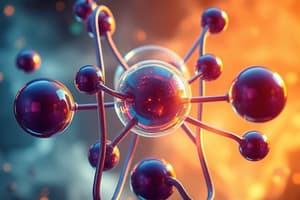Podcast
Questions and Answers
What is the primary difference between a solid and a liquid?
What is the primary difference between a solid and a liquid?
- The particles are able to move past each other in a solid, while they are closely packed in a liquid.
- The volume of a solid is fixed, while the volume of a liquid is variable.
- The particles are packed together in a solid, while they are widely spaced in a liquid.
- The shape of a solid is fixed, while the shape of a liquid is variable. (correct)
What is the term for the process by which a gas changes to a liquid?
What is the term for the process by which a gas changes to a liquid?
- Melting
- Freezing
- Condensation (correct)
- Evaporation
What is the primary characteristic of a compound?
What is the primary characteristic of a compound?
- It is a pure material with a fixed composition and properties.
- It is a substance that cannot be broken down into simpler substances by chemical means.
- It is a combination of two or more substances, where each substance maintains its properties.
- It is formed by the chemical combination of two or more elements. (correct)
What is the term for the ways a substance reacts with other substances?
What is the term for the ways a substance reacts with other substances?
What is the primary difference between an element and a compound?
What is the primary difference between an element and a compound?
What is the term for a solid changing to a liquid when heated?
What is the term for a solid changing to a liquid when heated?
What is the term for the three main parts of an atom?
What is the term for the three main parts of an atom?
What is the definition of matter?
What is the definition of matter?
Flashcards are hidden until you start studying
Study Notes
Definition and Composition
- Matter is anything that has mass and occupies space.
- It is composed of tiny particles called atoms, which are the building blocks of matter.
- Atoms are made up of three main parts: protons, neutrons, and electrons.
- Protons and neutrons are found in the nucleus (center) of the atom.
- Electrons orbit around the nucleus.
Types of Matter
- Solids: have a fixed shape and volume, with particles closely packed together.
- Liquids: have a fixed volume but take the shape of their container, with particles close together but able to move past each other.
- Gases: have neither a fixed shape nor volume, with particles widely spaced and free to move.
Properties of Matter
- Physical Properties: can be observed or measured without changing the composition of the substance.
- Examples: color, shape, size, texture, odor, melting point, boiling point.
- Chemical Properties: describe the ways a substance reacts with other substances.
- Examples: reactivity, flammability, toxicity.
States of Matter Changes
- Melting: a solid changes to a liquid when heated.
- Freezing: a liquid changes to a solid when cooled.
- Evaporation: a liquid changes to a gas when heated.
- Condensation: a gas changes to a liquid when cooled.
Mixtures and Substances
- Mixture: a combination of two or more substances, where each substance maintains its properties.
- Substance: a pure material with a fixed composition and properties.
- Element: a substance that cannot be broken down into simpler substances by chemical means.
- Compound: a substance formed by the chemical combination of two or more elements.
Definition and Composition
- Matter is anything that has mass and occupies space, composed of tiny particles called atoms.
- Atoms consist of three main parts: protons, neutrons, and electrons.
- Protons and neutrons are found in the nucleus (center) of the atom.
- Electrons orbit around the nucleus.
Types of Matter
- Solids: have a fixed shape and volume, with particles closely packed together.
- Liquids: have a fixed volume but take the shape of their container, with particles close together but able to move past each other.
- Gases: have neither a fixed shape nor volume, with particles widely spaced and free to move.
Properties of Matter
- Physical Properties: can be observed or measured without changing the composition of the substance.
- Examples of physical properties include color, shape, size, texture, odor, melting point, and boiling point.
- Chemical Properties: describe the ways a substance reacts with other substances.
- Examples of chemical properties include reactivity, flammability, and toxicity.
States of Matter Changes
- Melting: a solid changes to a liquid when heated.
- Freezing: a liquid changes to a solid when cooled.
- Evaporation: a liquid changes to a gas when heated.
- Condensation: a gas changes to a liquid when cooled.
Mixtures and Substances
- Mixture: a combination of two or more substances, where each substance maintains its properties.
- Substance: a pure material with a fixed composition and properties.
- Element: a substance that cannot be broken down into simpler substances by chemical means.
- Compound: a substance formed by the chemical combination of two or more elements.
Studying That Suits You
Use AI to generate personalized quizzes and flashcards to suit your learning preferences.




